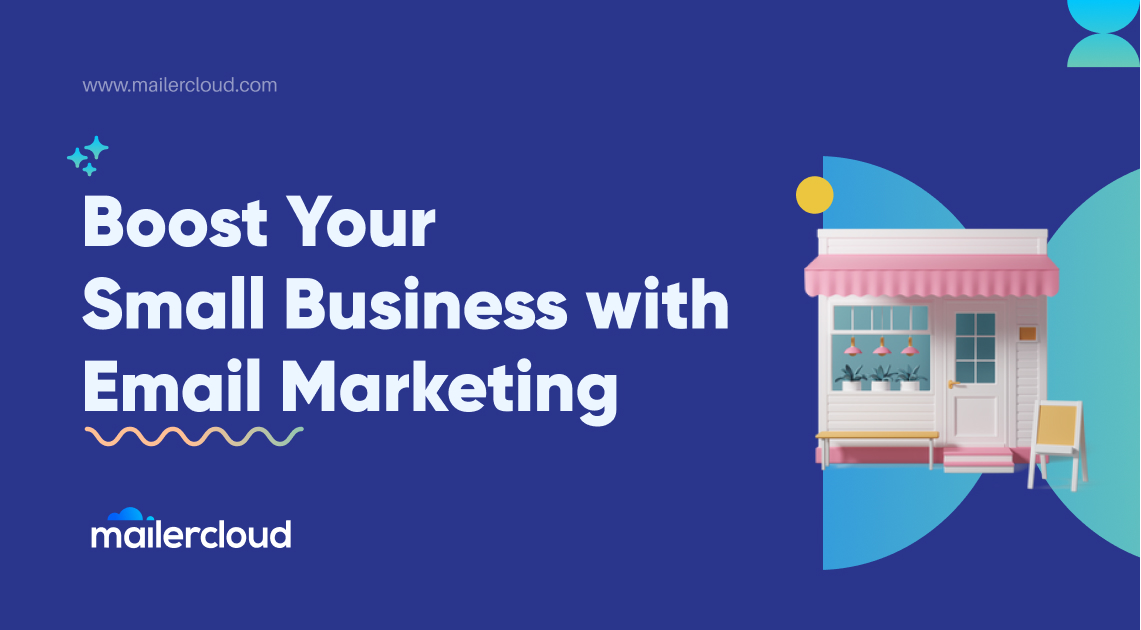Imagine having a tool that lets you speak directly to your customers, right into their personal space. That’s the power of email marketing.
As a small business owner, every decision you make is crucial for growth and success. You might wonder why email marketing should be at the top of your list. Well, picture this: a cost-effective strategy that not only enhances your brand's visibility but also builds lasting relationships with your audience.
It's like having a direct line to your customers' hearts and minds. With email marketing, you can tailor your messages to fit the needs and interests of your clients. It’s personal, targeted, and incredibly effective. You'll find that it’s not just about promotions or newsletters—it's about creating a dialogue with your audience. And unlike social media, where your message can get lost in the noise, emails land right where they need to be: in the inbox. This means a higher chance of being seen, read, and remembered. So, why is email marketing so important for small businesses like yours? Let’s dive deeper to uncover the hidden potentials and how they can transform your business into a thriving success story. Keep reading to discover how you can leverage this powerful tool to its fullest.

Credit: www.mailercloud.com
Benefits Of Email Marketing
Email marketing helps small businesses reach customers directly, boosting engagement and sales. It’s cost-effective and easy to measure. Personalizing messages increases trust and loyalty.
Email marketing has become an essential tool for small businesses aiming to grow their customer base and build lasting relationships. With its ability to target specific audiences, email marketing offers several benefits that can help you stand out in a crowded market. Let's explore some of the key advantages that make email marketing a must-have strategy for your business.
Cost-effectiveness
For small businesses with tight budgets, every dollar counts. Email marketing is one of the most cost-effective ways to reach your audience. Unlike traditional marketing methods such as print ads or TV commercials, email marketing allows you to communicate directly with your customers without breaking the bank. Think about the last time you received a promotional email that caught your attention. Chances are, it was sent by a small business looking to engage with you affordably. With tools like Mailchimp or Constant Contact, you can create professional campaigns without hefty costs.
Direct Communication
Email marketing provides a direct line to your customers. Unlike social media platforms where algorithms control visibility, emails land straight in your customer's inbox. This direct access means you can deliver your message without interference. Have you ever opened an email from a brand and immediately felt a connection? That's the power of direct communication. It allows you to speak directly to your audience, ensuring your message is heard loud and clear.
Personalization Opportunities
Personalization is the key to building strong customer relationships. Email marketing offers countless opportunities to personalize your messages based on customer preferences and behaviors. Imagine receiving an email that addresses you by name and recommends products based on your past purchases. It feels like the brand knows and values you, right? This personalized touch can significantly boost customer engagement and loyalty. By using segmentation and targeting, you can tailor your emails to meet the specific needs of your audience. This not only enhances the customer experience but also increases the chances of conversion. In a world where digital noise is constant, how do you ensure your message resonates? By leveraging the unique benefits of email marketing, small businesses can create meaningful connections with their audience, driving growth and success.

Credit: campaignrefinery.com
Building Customer Relationships
In the bustling world of small businesses, forging strong connections with your customers can be the key to success. Email marketing provides an excellent avenue for nurturing these relationships. It allows you to communicate directly with your audience and tailor your messages to their needs and preferences.
Imagine receiving a personalized email from your favorite local coffee shop. It makes you feel valued and understood, doesn’t it? This is the power of building relationships through email marketing. Let’s explore how you can create engaging content and maintain regular updates to enhance these connections.
Engaging Content
Content is the heart of your email marketing strategy. But what makes content engaging? It’s about speaking your customers' language and addressing their needs.
Share stories that resonate with them. Offer solutions to problems they face. You can even share behind-the-scenes glimpses of your business, creating a sense of intimacy and trust.
Think of an email that offered you a special discount on your birthday. It made you feel special, right? Personalization can be the key to captivating your audience and making them feel connected to your brand.
Regular Updates
Consistency is crucial in maintaining customer relationships. Regular updates keep your audience informed and engaged. But what should these updates include?
Share exciting news about your business. Announce upcoming events or new products. Regularly updating your customers demonstrates that your business is active and invested in their experience.
Consider a monthly newsletter that highlights what's new and exciting. It can become something your customers look forward to, building anticipation and engagement.
Can you recall a brand that faded from your mind because you hadn’t heard from them in a while? Regular communication prevents this, ensuring your brand stays top-of-mind for your customers.
So, how will you use email marketing to build lasting relationships with your customers? The possibilities are endless, and the rewards can be transformative for your small business.
Increasing Brand Awareness
Email marketing helps small businesses increase brand awareness by directly reaching customers' inboxes. This method builds trust and keeps your brand fresh in their minds. Regular updates with valuable content ensure your audience stays engaged, leading to stronger brand recognition.
Increasing brand awareness is crucial for small businesses aiming to carve out a space in a crowded market. Email marketing is a powerful tool that can help elevate your brand's visibility effectively. It allows you to communicate directly with your audience, keeping your brand top-of-mind. But how exactly does email marketing enhance brand awareness for your small business? ###
Consistent Messaging
Maintaining a consistent message across all platforms is essential for building a recognizable brand. Email marketing provides a unique opportunity to deliver your core message regularly. Each email sent is a chance to reinforce your brand values, voice, and image. Imagine receiving a personalized email every week from your favorite local cafe, sharing stories about their coffee origins and the barista's tips. This kind of consistency not only keeps you informed but also strengthens your connection to the brand. Are you ensuring your emails reflect the essence of your business every time? ###
Targeted Campaigns
One-size-fits-all approaches rarely work in marketing, and email campaigns are no exception. With email marketing, you can segment your audience to send tailored content that resonates with specific groups. This targeted approach enhances engagement, as recipients feel the content is relevant to them. Consider a small clothing boutique that segments its email list based on customer preferences. They can send personalized style guides or exclusive discounts on items a customer has previously shown interest in. This not only drives sales but also builds a loyal customer base that recognizes and trusts your brand. Have you tried segmenting your audience to see what difference it could make? By integrating these strategies into your email marketing efforts, you can significantly boost brand awareness. Remember, the goal is not just to send emails but to create meaningful connections that highlight your brand's unique story.
Driving Sales And Revenue
Email marketing plays a crucial role in driving sales and revenue for small businesses. It helps businesses connect directly with customers. This direct connection leads to increased sales opportunities. Email marketing offers a cost-effective way to reach a large audience. It provides valuable insights into customer preferences. Understanding these preferences can boost sales.
Promotional Offers
Emails are excellent for sharing special deals. Customers love discounts and exclusive offers. Sending promotional emails can attract more buyers. Offer limited-time discounts to create urgency. This strategy encourages quick purchases. Highlighting discounts in emails can increase sales. Make sure the offer is clear and enticing.
Upselling And Cross-selling
Email marketing is effective for upselling. Suggest products related to previous purchases. This increases sales without extra advertising costs. Cross-selling is another tactic. Promote complementary products in emails. Pair items that enhance the customer's experience. Upselling and cross-selling can increase revenue. Personalized recommendations make customers feel valued.
Measuring Success
Email marketing helps small businesses connect with customers directly. It's cost-effective and reaches a wide audience quickly. Measuring success through open rates and clicks shows its impact.
Email marketing is a powerful tool for small businesses, but how do you know if your campaigns are hitting the mark? Measuring success is crucial to understanding the effectiveness of your email marketing efforts. It allows you to see what's working and what needs improvement, ensuring that your marketing strategies are aligned with your business goals. Without measuring success, you're essentially shooting in the dark. So, how do you measure success in email marketing? Let's dive into the specifics.
Analyzing Metrics
When you send an email campaign, you have access to a wealth of data that can inform your next steps. Key metrics include open rates, click-through rates, and conversion rates. These numbers tell you how many people are engaging with your content and taking the desired actions. Imagine sending out a newsletter and seeing a high open rate but a low click-through rate. It might mean your subject line was compelling, but the content didn't encourage further interaction. This insight can guide your next campaign to focus on creating more engaging content. Have you ever wondered why some emails perform better than others? By consistently analyzing these metrics, you can identify trends and patterns. This enables you to refine your strategy and achieve better results over time.
Adapting Strategies
Once you've gathered data from your email campaigns, it's time to adapt your strategies. If you notice a particular type of content or subject line consistently performs well, consider using similar tactics in future emails. This iterative approach helps you build on your successes and learn from your failures. Perhaps you notice emails sent on a Tuesday morning receive more engagement than those sent on a Friday afternoon. Adjusting your send times based on this insight can lead to higher open rates and better overall performance. Adapting isn't just about making changes. It's about making informed decisions that align with your business objectives. Are you looking to drive more traffic to your website, or are you focused on increasing sales? Your goals will shape how you adapt your email marketing strategies. Measuring success in email marketing isn't just about numbers; it's about understanding your audience and continuously improving your approach. By analyzing metrics and adapting strategies, you can ensure your small business makes the most out of every email sent. So, are you ready to take your email marketing to the next level?

Credit: www.campaignmonitor.com
Best Practices
Email marketing holds great potential for small businesses. The right approach can lead to more customer engagement and sales. Understanding the best practices ensures success. These practices help small businesses create emails that connect with their audience.
Crafting Effective Emails
An effective email grabs attention. Start with a clear subject line. It should be short and direct. The email content should be engaging and valuable. Keep sentences concise. Use simple words that everyone understands. Personalization can make emails more appealing. Include the recipient's name or reference past interactions.
Visuals enhance the message. Use images or graphics to break the text. Ensure they are relevant. Always include a call to action. Tell the reader what to do next. Whether it's visiting a website or making a purchase. Test different elements. See what works best for your audience. Adjust based on feedback and results.
Maintaining Compliance
Compliance is vital in email marketing. Follow all legal requirements. The CAN-SPAM Act outlines rules for email communication. Always include an unsubscribe link. Make it easy for recipients to opt-out. Respect their choice. Include your business's physical address. This builds trust and transparency.
Only send emails to those who have opted in. This ensures you respect privacy. Avoid buying email lists. They often include uninterested recipients. Keep your email list updated. Remove inactive users. This improves deliverability rates. Regularly review compliance guidelines. Stay informed about changes in laws and regulations.
Tools And Resources
Email marketing connects small businesses with their customers effectively. It offers direct communication, fostering trust and loyalty. Affordable and easy to use, it helps in reaching a wider audience quickly.
Email marketing can be a game-changer for small businesses, but diving into it without the right tools and resources can feel like setting sail without a map. Thankfully, you don’t need to navigate these waters alone. With the right tools at your disposal, you can streamline your efforts, reach your audience more effectively, and watch your business grow. But what are these tools, and how can they help you? Let's break it down.
Email Marketing Platforms
Choosing the right email marketing platform is like picking the right car for a road trip—it needs to suit your needs and get you to your destination. Platforms like Mailchimp, Constant Contact, and SendinBlue offer user-friendly interfaces, making it easy for you to create beautiful emails without needing a design degree. These platforms often come with templates, so you can focus more on your message rather than design. Plus, they provide analytics to track your success, allowing you to see who opens your emails and what they click on. This data is vital to understanding what resonates with your audience.
Automation Tools
Time is precious, especially when running a small business. Automation tools can save you hours each week by handling repetitive tasks. Tools like Zapier and HubSpot automate your emails based on triggers like a new subscriber joining your list or a customer making a purchase. Imagine setting up a welcome email series that introduces your brand to new subscribers without you lifting a finger. These tools allow you to nurture relationships with your audience while you focus on other aspects of your business. Have you ever wished you could be in two places at once? With automation, your marketing efforts can be. Investing in the right email marketing tools and resources not only boosts your efficiency but also enhances your connection with your audience. What tools have you found indispensable in your email marketing journey? Share your experiences and let's learn together.
Frequently Asked Questions
How Does Email Marketing Boost Small Business Growth?
Email marketing boosts growth by directly reaching potential customers. It allows personalized communication and builds customer loyalty. Small businesses can promote products, share updates, and offer exclusive deals, driving engagement. It is cost-effective and measurable, enabling better strategy adjustments for improved results.
Overall, it enhances brand visibility and customer retention.
Why Is Email Marketing Cost-effective For Small Businesses?
Email marketing is cost-effective due to its low setup costs and high ROI. Small businesses can reach large audiences without expensive advertising. Automation tools save time and resources, maximizing efficiency. Detailed analytics help refine strategies, ensuring every dollar spent contributes to growth.
This makes it ideal for budget-conscious businesses.
What Are The Benefits Of Personalized Emails?
Personalized emails increase engagement by addressing recipients' specific needs and interests. They enhance customer experience, leading to higher conversion rates. By segmenting audiences, businesses can send relevant content, boosting open and click-through rates. Personalized emails foster customer loyalty, encouraging repeat business and improving long-term relationships.
How Can Small Businesses Measure Email Marketing Success?
Small businesses measure success through key metrics like open rates, click-through rates, and conversions. Analyzing these metrics helps identify effective strategies and areas for improvement. Tracking subscriber growth and engagement over time provides insights into customer preferences. Continuous monitoring ensures email campaigns align with business goals, maximizing impact.
Conclusion
Email marketing boosts small business growth effectively. It connects directly with your audience. Builds customer loyalty. Drives sales without high costs. Offers measurable results. Small businesses gain competitive advantages. Email marketing increases brand awareness. It's a powerful tool for engagement.
Easy to implement. Customizable to fit your needs. Start today and see the benefits. Email marketing is essential for success. Keep your business thriving. Stay connected with your customers. Make your small business a strong presence. Embrace email marketing as a valuable strategy.
Your small business deserves the best tools. Email marketing is one of them.

